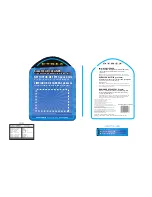
EN
53
White Balance Adjustment
A term that refers to the correctness of colour
reproduction under various lighting. If the white
balance is correct, all other colours will be
accurately reproduced.
The white balance is usually adjusted automatically.
However, more advanced camcorder operators
control this function manually to achieve a more
professional colour/tint reproduction.
1
Set the Power Switch to “
” while pressing
down the Lock Button located on the switch.
Open the LCD monitor fully or pull out the
viewfinder fully.
2
Press the
MENU
Wheel in. The Menu Screen
appears.
3
Rotate the
MENU
Wheel to select “
W.BALANCE”, then press it. The W.BALANCE
Menu appears.
4
Rotate the
MENU
Wheel to select the desired
mode.
“AUTO”
– White balance is adjusted
automatically (factory
preset).
“
MWB”
– White balance is set
manually.
“
FINE”
– Outdoors on a sunny day.
“
CLOUD”
– Outdoors on a cloudy day.
“
HALOGEN”
– A video light or similar
type of lighting is used.
5
Press the
MENU
Wheel in. Selection is
complete. Press the
MENU
Wheel in again.
The Menu Screen closes and the selected
mode indicator except “AUTO” appears.
To Return To Automatic White Balance . . .
... select “AUTO” in step
4
. Or, set the Power
Switch to “
”.
NOTE:
White balance cannot be used when Sepia or
Monotone (
Z
pg. 47) is activated.
Manual White Balance Operation
Perform Manual White Balance when shooting under
various types of lighting.
1
Follow steps
1
through
4
of the white balance
adjustment, and select “
MWB”.
2
Hold a sheet of plain white paper in front of the
subject. Adjust zoom or position yourself so that
the white paper fills the screen.
3
Press the
MENU
Wheel in until
begins
blinking rapidly.
When the setting is completed,
resumes
normal blinking.
4
Press the
MENU
Wheel in twice. The Menu
Screen closes and the Manual White Balance
indicator
is displayed.
White paper
Power Switch
MENU Wheel
To Change The Tint For Recording . . .
.... in step
2
, substitute coloured paper for white.
The white balance is adjusted based on the
colour, changing the tint. Red paper = deeper
green; blue paper = orange; yellow paper =
deeper purple.
NOTES:
●
In step
2
, it may be difficult to focus on the white
paper. In such a case, adjust focus manually
(
Z
pg. 51).
●
A subject can be shot under various types of
lighting conditions indoors (natural, flourescent,
candlelight, etc.). Because the colour temperature
is different depending on the light source, the
subject tint will differ depending on the white
balance settings. Use this function for a more
natural result.
●
Once you adjust white balance manually, the
setting is retained even if the power is turned off
or the battery removed.
















































